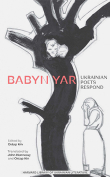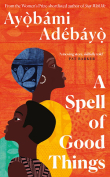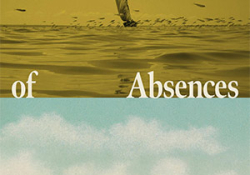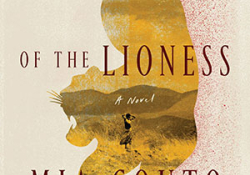The Drinker of Horizons by Mia Couto
 New York. Farrar, Straus and Giroux. 2023. 256 pages.
New York. Farrar, Straus and Giroux. 2023. 256 pages.
Mozambican writer Mia Couto concludes his Sands of the Emperor trilogy with The Drinker of Horizons, again translated from Portuguese by David Brookshaw, following Woman of the Ashes (WLT, May 2018) and The Sword and the Spear (WLT, Autumn 2020). The third title springs from “Mar Absoluto” (Absolute sea), by Brazilian poet Cecília Meireles. Couto broadens the last tale’s borders to reflect those uprooted from homelands throughout history. Although fiction, the book draws from actual incidents.
A summary opens the third in 1895 as the second ended—with a boatload of prisoners. Ngungunyane, last ruler of the seventy-eight-year-old independent African kingdom of Gaza, who resisted European colonizing until conquered by the Portuguese, is Zulu royalty of the VaNguni tribe. Seven wives and his son Godido accompany him to Lisbon. His rival, rebel Nwamatibjane Zixaxa of the Mfumo tribe, is also exiled. There’s bitterness between them as well as between two Portuguese military officers: Andrea (boat captain) and Mouzinho (voyage captain). Mouzinho warns Andrea, “Never place your trust in the horizon.”
The small ship, Africa, runs aground leaving Mozambique. The Portuguese worry about ambush. Queen Dabondi leaps off to speak to the river. People on shore push the boat off. Prisoners transfer later to a larger ship bound for Lisbon. Imani Nsambe, fifteen, is interpreter. Of the VaChopi tribe, she learned Portuguese in school. Imani translates for the Portuguese as well as the various Gaza tribes, becoming a conduit for everyone’s grievances—European and African. “More than just a translator, I am a bridge.
. . . My legs carry words, and with these I spin a web that joins the different races.”
Sadly, her lover, Sergeant Germano de Melo, remains in Gaza, exiled for working against the Portuguese crown. Imani is pregnant with his child. Could the storyline become any more complicated? Actually it does, for during the long voyage, Captain Andrea falls in love with Imani and withholds Germano’s letters to her as they arrive.
“You know what we want from you,” Captain Mouzinho tells Imani, asking her to spy on her own people. “Translating will only be the visible part of your work.” The ship stops in Cape Town, where Blacks cannot go ashore. Mouzinho wants to bask in glory, putting Ngungunyane on display.
Prisoner Roberto Machava, a Black Methodist priest, leads a faction collecting glass shards to assassinate Ngungunyane, who’s depressed and drinking. Will he die of alcoholism before they kill him? Religion becomes another theme, along with irony as Zixaxa surprisingly aids his former rival. Horizons swim in a sea of metaphors. Acrimony abounds, as do sexual advances, rapes, and never-ending sorrow. Imani befriends almost everyone, although later the queens attack her.
As Couto establishes character personalities, their interactions gain power. Prisoners in carriages are paraded through the Lisbon crowd. Portuguese call Ngungunyane “the Lion of Gaza.” Are they afraid of him competing with their King Carlos? “The title confers upon him the nobility of a king,” Couto explains. “But the Europeans reserve one of three fates for lions. To be hunted, to be caged in a zoo, or to be domesticated in a circus. The king of Gaza unites these fates in one person.”
Ngungunyane, developing pleurisy in his underground dungeon, is hospitalized. Dabondi cannot touch Imani, seven months pregnant, because Imani is “impure,” carrying “a mulatto inside.” Ngungunyane returns, demanding, and receiving, better prison conditions. Women come to “civilize” the prisoners—how to use cutlery, not hands, to eat. Imani, in her own cell, is told to gather information for the Portuguese to help quell the rebellion back in Mozambique. She makes things up.
Germano’s mother, Laura de Melo (who lives in Lisbon), brings Imani a letter. Germano explains he won’t return to Portugal until the monarchy is overthrown. Dona Laura knits a coat for her grandson when he’s born, telling Imani: “Don’t come near. I don’t want any intimacies.”
When Imani’s son Sanga arrives, his grandmother comes to take him. Queens brandish kitchen knives to prevent her. Soldiers stop them, packing everyone onto a ship for exile in the Azores, where polygamy is not tolerated. So Imani and the queens go to a remote island, São Tomé: “an exile within an exile.” Zixaxa learns Portuguese and writes letters to Imani. Decades later, heartbroken back in her native village, Imani is surprised by a young visitor. Such an eloquent ending.
Mia Couto won the 2014 Neustadt International Prize for Literature and was a finalist for the 2016 Man Booker Prize. Then he garnered the 2020 Jan Michalski Prize for Literature on the basis of this emotional trilogy. An innovative architect, Couto has designed a multidimensional literary structure with windows from which to view colonialism. One weeps.
(Editorial note: Couto discusses the trilogy in an interview with Anderson Tepper that appeared on the WLT blog in April 2023. The January 2015 issue spotlighted Couto as the 2014 Neustadt Prize laureate.)
Lanie Tankard
Austin, Texas





































